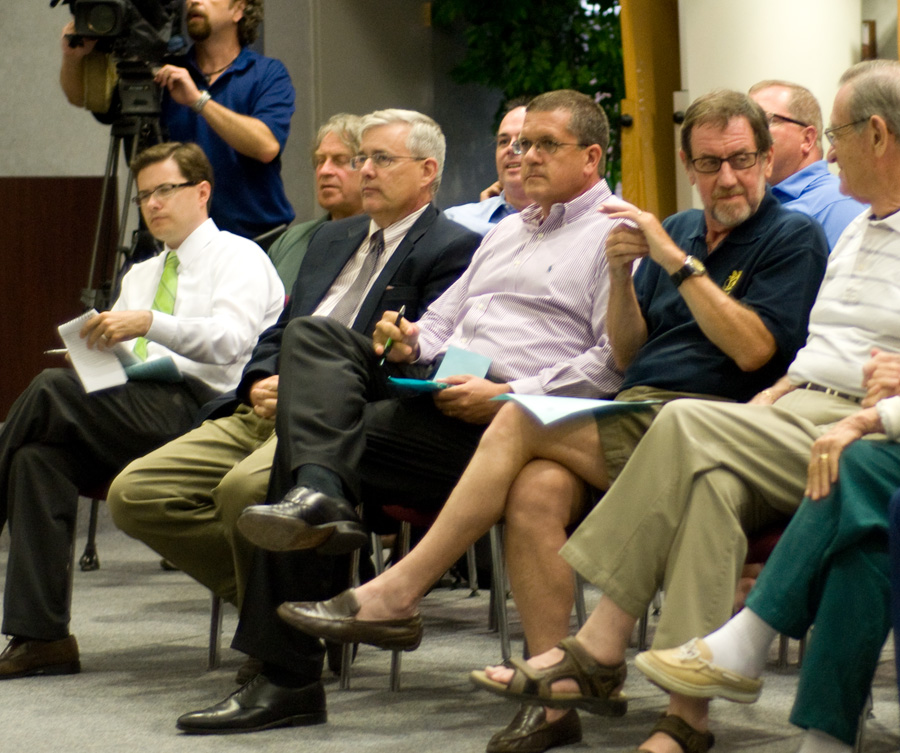The Blue Ash Municipal & Safety Center was the scene of high political drama Thursday night. After 90 minutes of public comment, with zero Blue Ash or Cincinnati residents speaking in favor of Blue Ash rescinding its 2006 agreement to purchase 130 acres of the Blue Ash Airport from the City of Cincinnati, by a 6-1 vote Blue Ash City Council did just that.
Ordinance 2012-41 authorizes Blue Ash’s city manager to rescind the 2006 transfer of title of the Blue Ash Airport from the City of Cincinnati. On August 29, that title will be briefly transferred back to the City of Cincinnati and Cincinnati will return approximately $6 million in payments it has received to date from Blue Ash. After appropriate paperwork is signed, Blue Ash will immediately return the $6 million to Cincinnati and title will be returned to the City of Blue Ash. After the airport operations cease on September 1, Blue Ash will gain full possession of the property and can commence construction of a long-planned park.

COAST leader Chris Finney takes notes as the City of Blue Ash voted against his personal wishes. Photograph by Jake Mecklenborg for UrbanCincy.
This unusual procedural step is necessary because after the cities of Blue Ash and Cincinnati signed their 2006 agreement, the Federal Aviation Administration (FAA) restricted Cincinnati’s use of the proceeds. Specifically, the FAA prohibited Cincinnati from using any of the $37.5 million for non-airport capital improvements. Since 2007, Cincinnati has planned to use $11 million of the Blue Ash Airport sale to fund construction of the Cincinnati Streetcar, with the remainder programmed for roadwork and other capital improvements.
At Thursday’s meeting, Blue Ash City Council scolded the local media for not having informed the public that it was the FAA who suggested that Blue Ash rescind the sale as a way for both parties to achieve their goals on schedule. The paperwork to be filed on August 29 allows for the avoidance of an estimated two years of litigation in federal court, meaning Blue Ash’s annual payments to the City of Cincinnati can continue uninterrupted. Cincinnati can use those capital funds however it sees fit, and Blue Ash can proceed with converting 130 acres of the Blue Ash Airport into a park.
The planned park was promised to Blue Ash voters who approved a .25% city earnings tax in 2006. Revenue from this tax has already paid for construction of a new city recreation center and the new Cooper Creek Event Center adjacent to the municipally owned Blue Ash Golf Course.
The facts of the situation as described above were entirely absent from the 90 minutes of emotional citizen comments that proceeded council’s action. Speaker after speaker, led by Mary Kuhl of Westwood Concern and various members of COAST, incited the crowd into raucous clapping and heckling of Blue Ash City Council.
Chris Finney, COAST’s central figure, threatened Blue Ash with a ballot referendum that would rescind the rescinding of the 2006 sale of the airport to Cincinnati, creating a legal mess his law firm would no doubt attempt to be hired to untangle.
After public comments, five of the seven city council members explained their rationale for voting to approve Ordinance 2012-41. All voiced frustration with the local media’s inability to factually report the situation and called out Chris Finney and COAST for unethical behavior. Several Blue Ash council members reported that Finney had called them at home, and described his actions as an effort to extort Blue Ash. One council member went as far to sarcastically call Finney “The World’s Greatest Lawyer”, while another simply referred to him as a coward.
After city council presented the facts and context that Chris Finney had distorted or omitted in his week-long media blitz, there was no heckling to be heard as Ordinance 2012-41 was approved.
As council returned to its routine business after the nearly two-hour episode concocted by same man who has brought so much chaos to Cincinnati’s municipal affairs since the early 1990s, the crowd that had been calling for Blue Ash Council’s heads earlier in the evening quietly shuffled out of the building.
The misled public, however, had no opportunity to redirect their ire at Finney since he had left the building more than an hour earlier.
